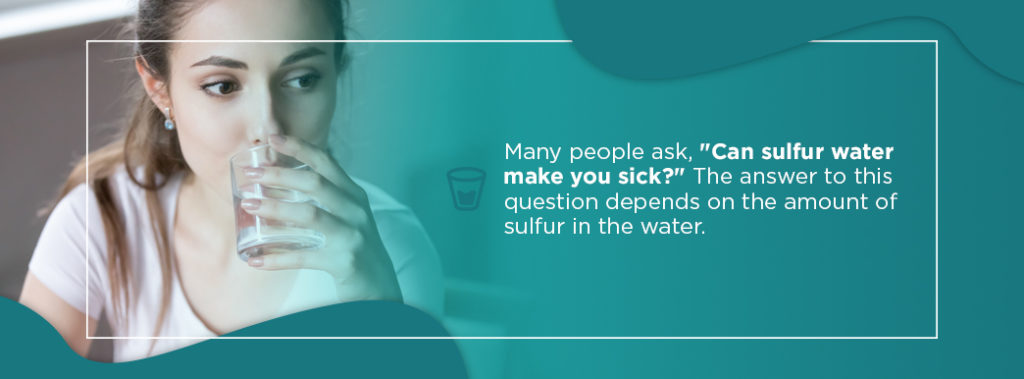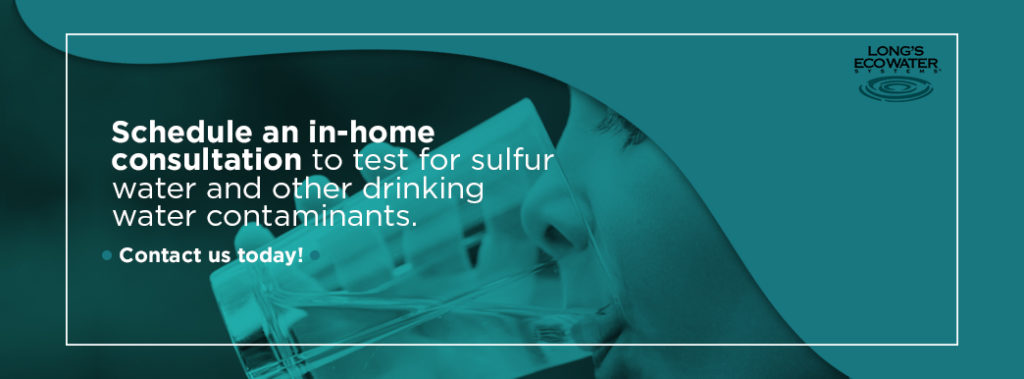How to Get Rid of Sulfur Smell in Water

If you notice a rotten egg smell in your water, you're probably wondering if you and your family are safe. A rotten egg odor is a sign that the sulfur levels in your water may be too high. Sometimes, a strange smell indicates the presence of other contaminants.
It's understandable if you don't want to drink or bathe in foul-smelling water, nor should you have to. Good, clean water is free of taste or odors and doesn't pose any risks to your health. If your water has an unpleasant rotten egg smell or taste, we're here to help. In this post, we'll explore the risks associated with sulfur water, answer common questions and show you how to treat sulfur water. You can have clear water that doesn't smell bad or damage the pipes in your home, whether your water comes from a well or a public source.
What Are Sulfates and Hydrogen Sulfide?
Sulfates naturally occur in rocks and soil. Over time, sulfates eventually dissolve and get into the groundwater— the source of well water. Sulfate does not produce gas and is therefore odorless.
Hydrogen sulfide gas also occurs naturally and can come from many different sources under the ground, such as rotting plant material or bacteria. You might imagine tiny bacteria eating sulfur and then producing hydrogen sulfide gas as waste. It's not very comforting knowing that smelly water is the product of bacteria waste.
Hydrogen sulfide may also result from wells drilled in shale or water heaters that contain magnesium rods. Regardless of the cause, you may notice the odor more when you use hot water, because heated water releases the trapped gas faster than cold water.
Is Sulfur Water Dangerous?

Many people ask, "Can sulfur water make you sick?" The answer to this question depends on the amount of sulfur in the water. While most household water supplies do not have dangerous levels of sulfur, if the level is too high, it can cause stomach pain and nausea. Similarly, high levels of sulfates in the drinking water can be problematic, particularly for infants.
In many cases, the biggest problem with sulfur water is the way it tastes or smells. Most people can detect hydrogen sulfide in water in a small concentration of 0.5 parts per million (ppm). Water with sulfur concentrations ranging from 0.5 to 1 ppm smells musty, while levels higher than 1 ppm produce a rotten egg smell and corrode metal pipes.
Can You Drink Sulfur Water?
If the sulfur level in your drinking water is not too high, it shouldn't lead to any health issues. However, too much sulfate could lead to the following problems:
- Diarrhea and dehydration: Drinking water with a high sulfate content can have a laxative effect and lead to diarrhea, which can then cause dehydration.
- Bitter taste: Sulfates can cause a bitter taste due to scale deposits in pipes.
- Pipe-clogging slime: Sulfates can lead to slime that clogs pipes or stains clothing.
- Ineffective bleach: Sulfates may reduce the power of bleach and make it difficult to clean clothing adequately.
Hydrogen sulfide also does not cause health issues in drinking water as long as the levels are not too high, but it can cause other problems such as the following:
- Foul odor: Hydrogen sulfide causes a rotten egg smell in water, and can make drinks and other beverages unappetizing.
- Poor taste: Hydrogen sulfide can affect the taste of drinks and food.
- Corroded metal: Hydrogen sulfide wears away metals such as iron, steel and copper. As a result, hydrogen sulfide can shorten the lifespan of pipes and affect a home's plumbing system.
- Stained fixtures: Hydrogen sulfide may cause yellow or black stains on fixtures in the bathroom or kitchen.
- Tarnished utensils: Hydrogen sulfide can create a black tarnish on silverware and stain copper or brass utensils.
Is Sulfur Water Good for Your Hair and Skin?
Many believe consuming sulfur or bathing in sulfur water has benefits for skin, hair and nails, but there is limited scientific evidence supporting the beauty benefits of this mineral. Many common foods, such as eggs, fish and poultry, naturally contain sulfur. A balanced diet will provide all the sulfur you need, and consuming too much sulfur can lead to gastrointestinal symptoms.
How to Remove Sulfur From Water
The first step to removing sulfates and hydrogen sulfide from your water is to get your water tested in-person by a trained professional. Doing so will determine the exact cause of poor-tasting and foul-smelling water. Ensure there are no other contaminants in your water you may be unaware of, such as bacteria. Sometimes, sewage pollution, which contains harmful contaminants like coliform bacteria and nitrates, is the cause of the odor, so it's essential to test your water. A water test will also show you how much sulfur is in your water, so you can take the right steps to fix the issue.
Even if you're not concerned about sulfur levels, it's still a smart idea to test your water. The Department of Environmental Protection, Environmental Protection Agency and Penn State University all recommend homeowners with private wells test their water annually for bacteria.
Once you know what's in your water and how much, you can take the proper steps to remove contaminants. The best treatment depends on the level and form of hydrogen sulfide or sulfates in your water, and if other contaminants are present as well. Some water treatment options include the following:
- Aeration: An aeration removal method adds air to the water, which may reduce the levels of hydrogen sulfide in the water. This method requires installing an aeration system to add air to well water before it enters the home.
- Neutra Sul:Neutra Sul (hydrogen peroxide) neutralizes sulfur's rotten egg smell and pollutants through oxidation. Neutra Sul has a proven consistency and can be used to prevent the formation of colors, tastes, corrosion and scaling by pollution degradation. The stabilizer in Neutral Sul provides 5 times the shelf life of standard hydrogen peroxide 7%. Pro Neutra Sul is NSF Certified to meet NSF/ANSI Standard 60 for drinking water additives.
- Iron removal filter: You can use an iron removal filter that will remove moderate amounts of hydrogen sulfide. The filter chemically reacts with the hydrogen sulfide, turning it into insoluble sulfur, which the filtering process can then remove.
- Chlorine bleach:Chlorine bleach can remove hydrogen sulfide by reacting with hydrogen sulfide and destroying the odor. This method requires the use of an automatic chlorinator to feed chlorine into the water system. A filter system then removes the sulfur and other sediment formed.
Other options include installing a water treatment system at your sink or installing a new well. If the rotten egg smell results from a rod in the water heater, you may be able to solve the issue by replacing a magnesium rod with one made of aluminum or zinc.
Schedule a Water Test for Hydrogen Sulfide Today

If you smell rotten eggs in your water, we suggest having a professional test your water. You'll learn the cause of the odor, and you'll uncover any other potentially harmful contaminants in your water. A water expert will guide you to the best water treatment method for your unique situation, so you can drink water at home with peace of mind.
If you live in the Allentown, PA, area, and would like to get your water tested by professionals you can trust, reach out to us at Long's EcoWater Systems, Inc. We'll provide a complimentary in-home water analysis and tailor a solution to meet your needs. To start your journey toward clean, safe water, schedule your water test today!
Share:
How to Get Rid of Sulfur Smell in Water
Source: https://longsecowater.com/blog/is-sulfur-water-safe